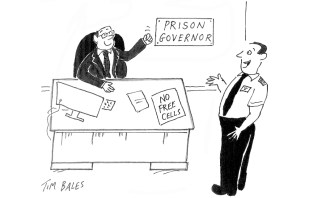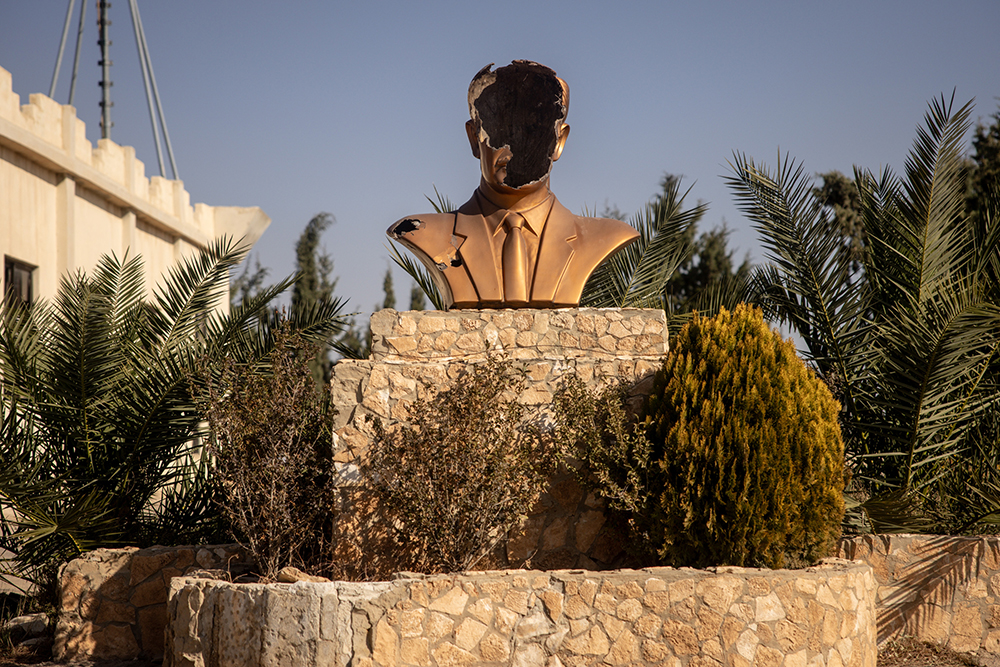
Rime Allaf takes the long view of Syria’s descent into hell. Her story begins with President Hafez al Assad, the architect of the socialist Baathist dictatorship that, from 1970 to 2000, immiserated and impoverished an entire nation before his son and successor Bashar utterly destroyed it.
It Started in Damascus is part history, part memoir, the story of a people whose hopes for a better life have been consistently strangled by the Assad dynasty for more than half a century. A Syrian-born writer and analyst who comes from a distinguished diplomatic family, Allaf is unflinching when she trains her sights on regime depravity. It makes for disturbing, compulsive and at times heart-in-the-mouth reading.
She is also merciless in exposing the third-rate emptiness of Arab dictatorship-speak. When Assad senior died in 2000, a state television presenter defaulted into sycophancy, praising: ‘The star who lit the sky of Syria and the Arabs for more than three decades… a lion who devoted his brain, body and heart for the sake of hoisting the banner of the nation.’
Dictatorships infantilise. What could be more contemptibly childish than the performance of Syrian members of parliament beating themselves into a televised frenzy of mourning before taking only minutes to amend the constitution, altering the minimum age of a president from 40 to 34, precisely the age of Bashar? They turned a revolutionary republic into a hereditary monarchy in the blink of an eye.
Syrians dared to dream then, as they dream again now. In the winter of 2000-01, intellectuals, writers and artists bravely called for the freeing of political prisoners; free speech; the restoration of basic civil liberties; multiparty democracy and the end of the state of emergency, which had been in place for more than 37 years. But with Assad père dead, Syria reverberated to the ‘God, Syria and Bashar only!’ chant of regime loyalists, precursor of the ‘Allah, Muammar, wa Libya bas!’ rallying cries of Gaddafi supporters during the Libyan revolution a decade later.
Allaf reminds us that back then Assad junior was known as ‘the Hope’. Some hope. Under Bashar, repression and corruption intensified. Syria’s only booming exports were its own people. Currently there are an estimated 6.6 million refugees outside the country, with 6.7 million Syrians displaced internally. In 2011, Bashar’s earliest, instinctive response to protestors on the streets was savage repression, ‘killing his way through peaceful demonstrations and funerals on repeat’. More than 650,000 Syrians lost their lives in the civil war.
Under Bashar, repression and corruption intensified. Syria’s only booming exports were its own people
Foreign Middle East pundits come and go, but one of the strengths of this book is that Syrian-born Allaf, no stranger to punditry herself, is no stranger to Damascus under Assad rule either. She pays generous and abundant tribute to her compatriots, the ‘tremendous fortitude of this warm and hospitable people’, the ‘quintessentially bon vivant, foodie and amiable’ Syrians.
It Started in Damascus takes its place among the proliferating crop of books on the Syrian revolution, of which two still stand out. Fouad Ajami’s The Syrian Rebellion was a surefooted blend of history and reportage, while Samar Yazbek’s apocalyptic study, A Woman in the Crossfire, contained passages mesmerising in their sheer horror. The descriptions of the scream-filled torture chambers she was forced to enter, in which men hung from hooks in various states of agony and decomposition, one prisoner with a back split open ‘as if a map had been carved into it with a knife’, are visceral and unforgettable. The reader is spared such trials here.
It will take a monumental effort to recover from 54 years of Assad dictatorship, let alone 14 years of civil war. Allaf, who lambasts the West’s abandonment of Syria to Assad and Moscow, calls for her compatriots to achieve their rightful destiny. Yet it is a sign of our collective desperation, both of Syrians and the wider world, that hopes of a freer, more peaceful and prosperous nation lie on the shoulders of President Ahmed al Sharaa, a former al Qaeda terrorist.

The jury is necessarily still out, but you don’t need to sniff too hard to smell the rot. Sectarian killings have horrified Syrians, assurances of transparency, inclusion and reconciliation have shaded into opacity, autocratic decision-making and justice delayed. In place of economic growth and an end to regime venality, there is a resurgence of corruption, according to a leading industrialist. During Assad’s time, officials shook his factories down monthly, he told the Financial Times last month: ‘Now it’s once a week and there are more of them.’
Towards the end of her story, Allaf reminds us of the Syrians’ innate empathy and good manners as friends and family come together during ‘interminable’ condolence calls after the death of a loved one. Perhaps the best way to finish is with the words of encouragement mourners frequently use when taking their leave of the bereaved, though for anyone familiar with the country’s tortured history, it is exceedingly difficult to set much store by it: ‘May this be the end of your sorrows.’







Comments